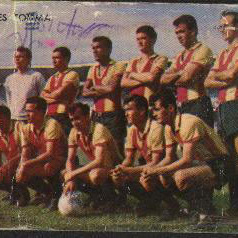I really hate driving but it takes me 30 min to drive somewhere where public transportation takes me 2 hours. Driving saves me 3 hours a day.
If public transportation was good, I wouldn’t drive.
That is exactly the point of this meme. The resource allocation for building car infrastructure has been massive since the '60s while transit has been left behind as it is way less of a oppurtunity for car manufacturers and oil companies to profit from it and yeah, they do have a saying bigger than yours when it comes to deciding your country’s politics. (See
corruptionlobbying)But it means rebuilding cities. We should absolutely do it, but entirely reworking how everyone gets around is gonna take a while even best case scenario. But that’s why we should get started now!
We already bulldozed and rebuilt our cities for the car, so there’s certainly no reason we can’t do it again. It should be easier this time, though, as the main things we have to demolish are parking lots and stroads, not entire city blocks of dense housing. See Cincinnati below:

Legalized bribery.
From my interpretation, this meme suggests we should just stop building cars. The fact we are buying so many cars is just a testament on how bad public transportation is. Even with traffic I still manage to get 1 hour and half faster than public transportation by train + subway.
I wish the solution was as simples as a resource redirection, but unfortunately it would require some city planning and possibly rebuilding around public transportation. Not gonna happen, I guess.
It would require those things and time, yes. I don’t think anyone is suggesting public transit in the US would be viable overnight.
In an alternate world you’d complain cars can never work because there isn’t enough space for them on roads, and there’s never any parking when you arrive. (Oh, and accidents)
deleted by creator
I hate driving because of everything you just said!
Welcome to Fuck Cars!
It’s a dead-simple concept that can be applied to everything: public money should only be used for public services. If the private sector is viable, it shouldn’t need public money to prop it up.
Public money should fund public transit. No public money for private transport infrastructure.
Public money should fund public schools. No public subsidies for charter and private schools.
Public money should fund public health care. No public funding should be wasted on propping up a wasteful private healthcare industry. ACA wastes so much money buying insurance for people when we could just build public hospitals and public clinics.
It’s not that private industry shouldn’t exist. It’s just that private industry, conceptually, shouldn’t need to be propped up by social funding. But currently it is. And it’s a tremendous waste of money. Public money should only fund public programs. So simple.
Aren’t bike lanes technically “private transport infrastructure” though?
As long as you can use it to walk/reduced mobility on, no. That allows everyone to use it.
You shouldn’t be walking in bike lanes. That’s what the sidewalk is for.
If you build wide enough tarmac, everyone can use it.
Shared-use paths work best when they’re low use and low-speed. Ergo why people will walk, bike and drive in the road on a cul de sac but not on a main stroad.
It’s common to have separate sidewalks and bike paths on faster, more commonly used routes, because bikes don’t actually mix all that well with pedestrians. It’s the same reason we don’t make sidewalks wide enough to drive a bus down.
By your logic, public car roads are fine so long as there’s a bus that drives down them. Even if 99% of the people on them are in a privately-owned bike or car.
Fair enough, it was an unthought retort to “bikes are private, cars are private, same thing.”
I’m against building roads for personal vehicles because it is very expensive. Sidewalks and bike paths are cheap to build, cost nothing to maintain (other than SNIC) and last 30+ years.
I’m also not opposed to building roads for the transport of goods and services, that’s why humans have built them for recorded history. I’ve got nothing against personal vehicles using roads built for trucks anyways (the maintenance cost of one truck on a road is equivalent to a lot of cars); so long as the cars don’t impede trucks.
My bigger issue the the building of roads specifically for personal vehicles and the building of free (or under market value) parking alongside roads, increasing their cost.
Also, why wouldn’t build bike paths the same width as a bus road? It lets you use the same SNIC fleet on paths and sidewalks as roads, allows emergency vehicles to pass, and provides easier access to path amenity maintenance.
Please define “private transport infrastructure”…
Like, do you mean roads and lanes on private property, where the property owner can legally post a “No Trespassing” sign?
Because if that’s not what you mean, then pretty much every transportation path is public transportation.
Corporate owned for profit. Simple
I work for an auto company. I can tell you they don’t want mass transit because it hurts profits. They would much rather jack up the cost of vehicles, offer deals on leases, and keep people locked into getting a new vehicle every few years. Just keep the machine running and fuck anything except their profits. You will see how shady the auto industry is once the strike happens next week
I like the concept of 15 minute cities/suburbs. You can get anywhere you need within 15 minutes, whether by public transport, bike, walking or car.
Isn’t the point of a 15 minute city that you can get anywhere within 15 minutes without a car?
(By the way, from a European standpoint it sounds really funny that 15 minute cities are not a reality for you. Like, why would you ever build a city differently in the first place?)
It’s pretty disingenuous to claim that your city founded in 1300 has tight streets and isn’t car-friendly because people in 1300 were really big on public transport.
And the answer is that cities grow descriptively rather than prescriptively. They generally add what is in demand/what they need piecemeal, and most US cities really grew in the 20th century.
That’s why NYC, for example, has significantly better public transport than most of the nation - it’s one of the oldest cities
This is also why moving to mass transit is a hard sell. It’s expensive and there is less demonstrated need and more forethought behind the switchover.
Not to mention that the US has far, far more land than Europe. It’s hard for many to imagine having to drive 3 hours just to get to a major city.
There’s an few distinctions about American culture as it relates to car culture.
-
America had/has a lot of land
-
Much of this is/was vastly underdeveloped right outside of urban hubs, unlike Europe/related which benefits from a tighter interconnected network of cities that more immediately benefit from mass transit systems
-
In the US post-WWII middle class and privileged were often sold an idea of peaceful suburban lifestyles away from urbanized areas
-
Car manufacturers marketed this successfully as a way to encourage families away from city life and thus build a more solid reliance on their vehicles
-
City planning was therefore often built around a suburban-city sprawl rather than a cohesive urban community designed around efficiency
deleted by creator
-
Like, why would you ever build a city differently in the first place?
Exactly. Unfortunately, in Australia, we tend to borrow stupid ideas from the US to make money and have sprawling suburbs with zero amenity.
For instance, we had a new suburbian development within 20km from the CBD with the promise of schools, community centres etc. in the early 2000s. When all the houses were bought and built, suddenly there’s no money for amenities so they just sold the land to developers who then put more houses in. Now the only way to get anything you need is by car because there’s no train or buses because it was supposed to be accessible by bike/walking but now isn’t. And not to mention gridlock of vehicles looking to get out of the suburbs for food etc. out of the one intersection provided.
I would love 15min cities without cars for my country but the attitude to cars here is similar to the attitude about guns in the US.
deleted by creator
I am also autistic. Unfortunately the train line doesn’t extend to my home town.
Because bikes are a way too efficient (on the short distances) and long lasting products to be lucrative. Public transportation as well didn’t guarantee the same annual income of fresh money that the car market do.
I got an ebike and rode 130 miles (note my ebike is 250w and geared) on the trail that I live near. Haven’t taken it out since last month because they started construction (resurfacing+replacing 2 bridges) that will last until next year.
I’m in a small town and the construction blocks both ways (meanwhile, the road alternative is often unshaded with grass/ditches on the sides, with at least one last-section I was on a few times before to get to another house having 40mph (though sparse) traffic). The trail made further journeys possible without complex navigation (and I’m not aware of many closer destinations due to the rurality).
Also my town has a railroad but no train-station (so no passenger rail) so I guess it’s rather fitting. Although at least the trail is getting fixed (also the trail used to be a rail).
This is a perfectly fitting example if you think what would instead happen if instead there were needed to be done construction on the road (they would do half lane at the time to allow traffic, or they would only work at night and reopen the road for the day, ft. Your tax money going to construction workers night shifts). As long as car drivers are seen as special requirements kids its always going to be made artificially easier to drive rather than commuting in other ways.
Just to be clear, my point (aside from that being rural sucks for transportation+there was only 1 option in this situation) is that the problem is infrastructure and planning rather than the vehicles themselves.
EDIT: And yeah, I don’t know why they didn’t split the job up into at least 2. [A to B] and [B to C] rather than [A-C] (and more sections could’ve probably been done when it comes to the resurfacing). Seems as if this were a sudden change after delays too.
deleted by creator
Because O I L E C O N O M Y.
Sure, but i also don’t think you can make a fatty use their legs
Yeah but how are we supposed to capture an entire nation of consumers and entrap them into paying for our products forever with that?
because politicians cash extra money when car manufacturers make more money than public transpsort manufacturers (trains, buses)
You would need much less material and that’s bad for economy.
Or to reframe it: the economy is bad for the environment.
Holy shit can you imagine? If we’d take all the investments that are done on a yearly basis for cars and we stuff that in trains, busses and bikes and their infrastructure?
We’d get walkable cities, cities would get more tax income, we’d all get healthier, we’d have tonnes of money left for parks… and we’d actually for once really do something to stoo climate change to boot
Ahhh to dream…it’s so nice. The world could be so pretty if people just weren’t such dumb egocentric assholes.
Even if we kept the car way of life (not saying we should) doesn’t it seem like there are way too many cars being produced? Like how many new cars do we really need every year? I honestly do not know the numbers, I’m just saying it sure seems like this many brand new cars don’t need to exist.
I mean
We made produce useless shit fucking all over the world nonstop, the stuff with functionality to me is like a drop in the bucket. How many stupid fucking packaging materials are in the guts of fishes because little Cindy wanted to get a W this year with her daughter and decided to buy her a pack of miniature plastic foods
Pisses me off man
Have any of you tried getting 3 kids around town with public transport? 10 minutes of kids songs in the car = 45 minutes of screaming and accusatory stares in the bus.
This woman clearly has one aggressively neurotypical child. Not 3 neurodivergent ones.
Probably. What are examples?
What?
Have you tried bringing your kids up properly 😂
Have you tried sucking my buttery grundle?
deleted by creator











